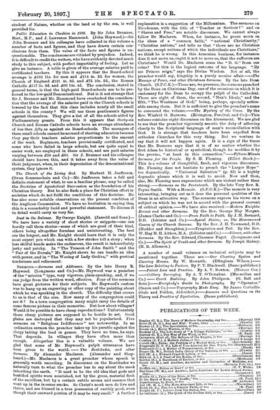SERMONS.—Sermans and Addresses. By the late Henry R. Heywood. (Longmans
and Co.)—Mr. Heywood was a preacher of the "mission" type, very vigorous, plain-speaking, and, if we can judge from the written word, effective. Four of the sermons have great pictures for their subjects. Mr. Heywood's custom was to hang up an engraving or other copy of the painting about which he was speaking in the church. The difficulty that occurs to us is that of the size. How many of the congregation could see it ? In a town congregation many might carry the details of some famous picture in their memories. But how about villages P Would it be possible to have cheap reproductions ? Unfortunately these cheap pictures are supposed to be hostile to art. Good plates are destroyed that they may not be popularised. Five sermons on "Religious Indifference" are noteworthy. In an ordination sermon the preacher takes up his parable against the clergy taking the lead in games. They have no time, he says. That depends. In villages they have often more than enough. Altogether this is a valuable volume. We are glad that some of Mr. Heywood's pulpit utterances have been given to the world. — The Beatitudes, and other Sermons. By Alexander Maclaren. (Alexander and Shep- heard.)—Mr. Maclaren is a great preacher whose speech is generally worth recording. In discourses on the Beatitudes we naturally turn to what the preacher has to say about the meek inheriting the earth. "It used to be the old idea that gods and beatified spirits were nourished, not by the gross, material flesh of the sacrifices, but by a certain subtle aroma and essence that went up in the in cense smoke. So Christ's meek men do live and thrive, and are blessed in a true possession of earthly good, even though their outward portion of it may be very small." A further explanation is a suggestion of the Millennium. The sermons on Nicodenius, with the title of "Teacher or Saviour ? " and on "Slaves and Free," are notable discourses. We cannot always follow Dr. Maclaren. When, for instance, he pours scorn on the ideas of a "common faith," "national Christianity," "Christian nations," and tells us that "there are no Christian nations, except nations of which the individuals are Christians," we think he is wrong. In this Armenian business, for instance, does it not move us, ought it not to move us, that the sufferers are Christians ? Would Dr. Maclaren erase the "D. G." from our coins? Yet this is the logical outcome of his language. "By me Princes reign," says the Divine Wisdom. Not at all, the preacher would say, kingship is a purely secular affair.—The Message of Peace, and other Christmas Sermons. By the late Dean Church. (S.P.C.K.)—These are, we presume, the sermons preached by the Dean on Christmas Day, one of the occasions on which it is customary for the Dean to occupy the pulpit of the CathedraL There are eight of them, the second, "Man's Ideals," and the fifth, "The Weakness of God," being, perhaps, specially notice- able among them. But it is sufficient to give the preacher's name to commend the volume.—The Mystery of the Cross. By the Rev. Winfrid 0. Burrows. (Rivington, Percival, and Co.)—This volume contains eight discourses on the Atonement. We are glad to see that the preacher vigorously asserts the duty of adhering closely to the Scriptural language of man's reconciliation with God. It is strange that teachers have been expelled from orthodox Churches for this very thing. But we venture to say that it will not happen again. It is a sign of the times that Mr. Burrows says that it is of no matter whether the first Adam be historical or symbolical, though he modifies it by the proviso, "at least in this connection."—Fifteen-Minute Sermons for the People. By S. H. Fleming. (Elliot Stock.)— This is a volume of thoughtful, fresh, and vigorous discourses. Mr. Fleming does not hesitate to preach the "Larger Hope" too dogmatically. "Universal Salvation" (p. 55) is a highly dogmatic phrase which it is well to avoid. Now and then, also, Mr. Fleming uses expressions which are violent rather than strong.—Sermons on the Pentateuch. By the late Very Rev. R. Payne Smith. With a Memoir. (S.P.C.K.)—The memoir is very interesting, bringing out as it does the personal qualities of the Dean in an attractive way. The sermons express his views on a subject on which he was not in accord with the general current of critical opinion.—We have also received :—Modern Knights- Errant and other Sermons. By the Rev. George Hay Morgan. (James Clarke and Co.)—From Faith to Faith. By J. M. Bernard, D.D. (Isbister and Co.)—Spiral Stairs ; or, The Heavenward Course of the Church Seasons. By the Rev. J. H. Townsend, D.D. (Hodder and Stoughton.)—Temptation and Toil. By the Rev. W. Hay M. H. Aitken, M.A. (Isbister and Co.)—Silence, with other Sermons. By the Rev. Edward,Clarence Paget. (Longmans and Co.)—The Spirit of Truth and other Sermons. By Joseph Halsey. (H. R. Allenson.) A number of small volumes on technical subjects may be mentioned together. These are :—Our Clearing System and Clearing Houses. By W. Howarth. (Effingham Wilson.)— The Law Relating to Factors. By P. T. Blackwell. (Same publisher.) —Patent Law and Practice. By A. V. Newton. (Horace Cox.) --Colliery Surveying. By A. T. O'Donahue. (Macmillan and Co.) — Coach Building. By John Philipson. (G. Bell and Sons.)—Everybody's Guide to Photography. By "Operator." (Saxon and Co.)—Topography Made Easy. By James Corballis. (Gale and Polden, Aldershot.)—Answers and Questions on the Theory and Practice of Equitation. (Same publishers).


































 Previous page
Previous page